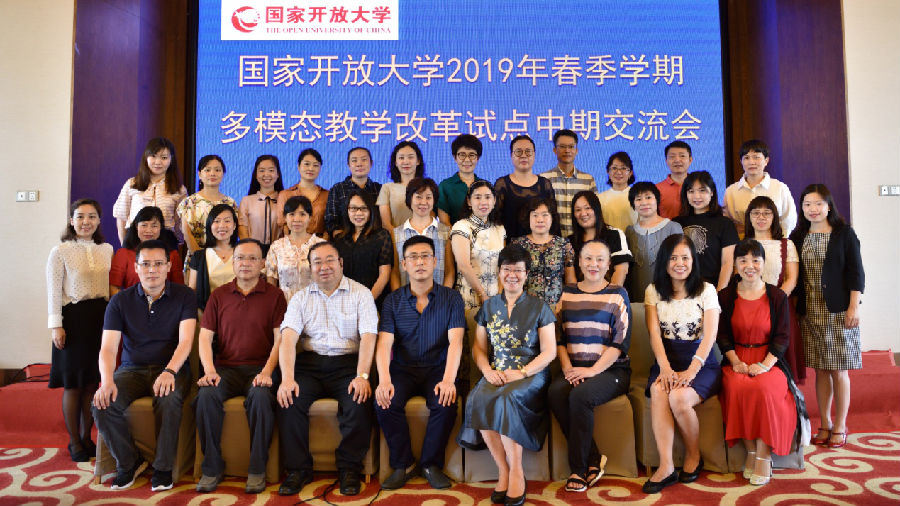 From 26-28 June 2019, the Faculty of International Languages and Cultures held a meeting to conduct mid-term exchanges for the second pilot programme on the Multimodal Teaching Reform Conference on New Public English Course in the spring semester of 2019 in Chengdu.
From 26-28 June 2019, the Faculty of International Languages and Cultures held a meeting to conduct mid-term exchanges for the second pilot programme on the Multimodal Teaching Reform Conference on New Public English Course in the spring semester of 2019 in Chengdu.
Teacher representatives from eight pilot units of the second pilot programme, including the Baoding subdivision of the Hebei Branch of the Open University of China (OUC), the OUC’s Sichuan, Fujian, Beijing, and Dalian branches, the Shanwei, Zhongshan, and Kaiping subdivisions of Guangdong Branch, and some teacher representatives from the first pilot units participated in the meeting and gave speeches. Vice President Wu Zhaohua from Sichuan Branch and Vice Director Zheng Jipeng from the OUC’s Faculty of International Languages and Cultures attended the meeting and delivered speeches. The meeting was chaired by Xiong Ying, Director of the Public Foreign Language Teaching and Research Centre of the Faculty of International Languages and Cultures.

On behalf of the Sichuan Branch, Vice President Wu Zhaohua first welcomed the teacher representatives from other units to Chengdu and expressed his great expectations for teaching reform, as well as wishing that the reform has fruitful results. Vice Director Zheng Jipeng thanked the Sichuan Branch for its support and welcomed all the participants on behalf of the OUC. He also introduced the related work of the Faculty of International Languages and Cultures in the first half of the year, including research on education reform, degree English, writing contests, and team building. He also broadcast special promotional films. On the 40th anniversary of the founding of the OUC, the Faculty of International Languages and Cultures joined hands with other departments in the school in order to build and launch a multilingual learning platform, which is a gift for the 40th anniversary.
The teacher representatives from eight pilot units gave work reports for the spring semester of 2019, fully demonstrating the characteristics of multi-modal teaching, with content covering "mixed teaching models,” "whole-network teaching models,” and "mobile learning models" for public English. The resource construction abilities and informatisation teaching abilities of the teaching team have been expanded and the learner support service level has been enhanced. The students' interest in learning has been mobilised and protected through various channels and as a result, the students' sense of belonging and self-identity have been enhanced and they have gradually made progress in English learning. At the same time, potential difficulties that could face teaching reform work in the future were analysed and the solutions were discussed. It is hoped that rules and regulations will be established as soon as possible, a work mechanism for the formative assessment of online teaching and both a student handbook and teacher's handbook for the teaching process and the improvement of cross-regional teaching team working can be created. It is also hoped that a replicable and popularisable curriculum team operation model can be established, in order to promote effective teaching and improve the quality of teaching.
Since the implementation of multi-modal teaching reform in the spring and autumn semesters of 2018, the first batch of teaching reform pilot projects in the spring and autumn semesters of 2018 have been successfully completed. The second batch of pilot projects were launched at the beginning of this year. Related work is planned to be completed by the end of this year.
By Liu Ning,OUC